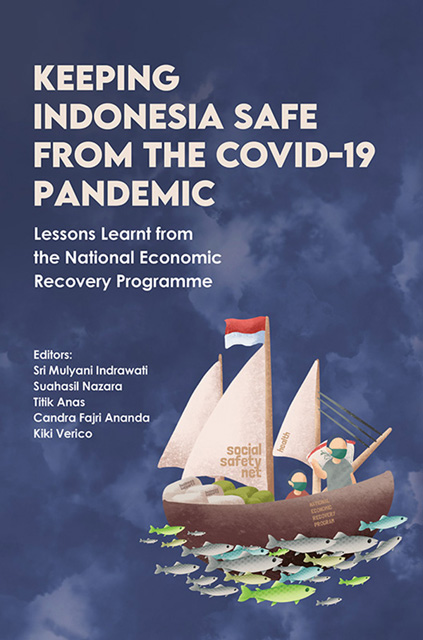 Keeping Indonesia Safe from the COVID-19 Pandemic
Keeping Indonesia Safe from the COVID-19 Pandemic Published online by Cambridge University Press: 30 June 2023
INTRODUCTION
The novel coronavirus 2019 (COVID-19) outbreak has devastating public health consequences and poses a major economic threat. The ongoing pandemic continues to chart the path for global public health and economic activities. The Johns Hopkins University Coronavirus Resource Center reported more than 470 million total confirmed cases worldwide in March 2022. Global economic growth shrank by 3.5 per cent in 2020 (Weiss et al. 2020; World Bank 2021), with a recovery projected to happen in 2021 and 2022. Globally, countries implemented various responses to COVID-19 which can be classified into four key areas: saving lives; protecting the purchasing power of the poor and vulnerable; saving jobs and businesses; restoring countries to become more resilient (World Bank 2020).
The first two confirmed COVID-19 cases in Indonesia emerged on 2 March 2020 and spread exponentially within a short time. By January 2022, the Indonesian National Disaster Management Authority (Badan Nasional Penanggulangan Bencana, or BNPB) reported more than 4.2 million cases. Indonesia had already faced three large waves of COVID-19 cases between 2020 and early 2022: the original Wuhan coronavirus variant in 2020, the Delta variant in mid-2021, and the Omicron variant in early 2022. The Indonesian government took various significant steps to reduce the spread of the virus and protect the poor and vulnerable families, jobs and businesses, and maintain economic recovery.
To reduce the spread of COVID-19 in the early days of the pandemic, Indonesia introduced international travel restrictions on 1 January 2020 before the first COVID-19 cases were detected in the country. The government introduced the Work, Study, and Worship at Home policy on 16 March 2020 and implemented large-scale social restrictions (Pembatasan Sosial Berskala Besar, or PSBB) on 31 March 2020 as recommended by many studies and international organizations (Glass et al. 2006; Gottlieb et al. 2020; Maharaj and Kleczkowski 2012; Reluga 2020).
Later, on 11 May 2020, Indonesia launched comprehensive health, economic and social containment measures, the National Economic Recovery (Pemulihan Ekonomi Nasional, or PEN) programme. It covers public health support, social protection for the poor and vulnerable, fiscal incentives and financial support for businesses. The government spent IDR575.9 trillion in 2020 and IDR657.1 trillion in 2021 for the PEN programme. In 2022, the government continued the programme by allocating IDR455.62 trillion.
To save this book to your Kindle, first ensure [email protected] is added to your Approved Personal Document E-mail List under your Personal Document Settings on the Manage Your Content and Devices page of your Amazon account. Then enter the ‘name’ part of your Kindle email address below. Find out more about saving to your Kindle.
Note you can select to save to either the @free.kindle.com or @kindle.com variations. ‘@free.kindle.com’ emails are free but can only be saved to your device when it is connected to wi-fi. ‘@kindle.com’ emails can be delivered even when you are not connected to wi-fi, but note that service fees apply.
Find out more about the Kindle Personal Document Service.
To save content items to your account, please confirm that you agree to abide by our usage policies. If this is the first time you use this feature, you will be asked to authorise Cambridge Core to connect with your account. Find out more about saving content to Dropbox.
To save content items to your account, please confirm that you agree to abide by our usage policies. If this is the first time you use this feature, you will be asked to authorise Cambridge Core to connect with your account. Find out more about saving content to Google Drive.